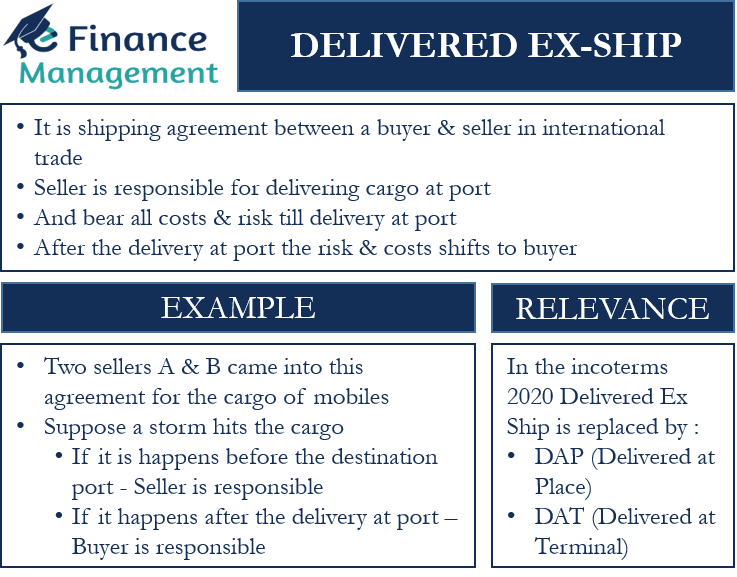Delivered ex-Ship or DES is a type of shipping agreement between a buyer and seller in international trade. In this, the seller is responsible for delivering the cargo at the port that the buyer wants.
So, the seller has to bear all costs and risks till the delivery of the cargo at the port that the buyer wants. The seller’s responsibility gets over when the cargo is on board the ship at the named port of destination and is ready for unloading. Or in simple words, we can say that seller’s responsibility ends when the ship reaches the specified port suggested by the buyer.
Once the cargo reaches the named port, the risk and cost shift to the buyer, so the buyer pays for all the costs once the cargo reaches the destination port. And that includes the cost to unload the cargo from the ship and clear the customs. Usually, shipping lines pay the unloading cost and include the same in the ocean freight, ultimately payable by the buyer.

Example of DES
We will try to understand the risk of the buyer and seller by the following example in the case of DES.
Suppose Seller A and Buyer B agree to send mobiles from China to California, U.S. Now both these parties agree to a DES arrangement for this transaction.
Scenario 1: Seller A ships the cargo from China. However, before the ship could reach California, it encounters a storm and sinks. In this case, the responsibility of the loss will be on the seller because the ship has not yet reached the destination port specified by the buyer.
Scenario 2: the ship reaches safely at the California port. However, a storm hits the California port and damages the ship and the cargo. In this case, Buyer B will be responsible for the loss as the seller’s obligation was complete once the ship reached the destination and the cargo was ready for unloading.
Delivered Ex-Ship – Not Relevant Now
Delivered ex-Ship is one of the Incoterms, or it would be correct to say that it was one of the Incoterms. In the Incoterms 2010, Delivered ex-Ship was replaced by DAP (Delivered at Place) and DAT (Delivered at Terminal).
DES was one of the most popular shipping agreements for inland, sea shipping, and charter shipping until 2011. Incoterms mean international commercial terms. ICC (International Chamber of Commerce) is responsible for publishing and updating the Incoterms.
In DAP, the seller has the responsibility to deliver the cargo to the place that the buyer wants. Thus, the seller bears all the risks and costs for delivering the cargo at the buyer’s place. However, once the seller delivers the cargo, unloading is the buyer’s responsibility (both in terms of risk and cost). We also know DAP as Delivered Duty Paid (DDP).
In DAT, the seller bears all the risks and costs until unloading the cargo at the specific delivery terminal. In this case, the seller also remains responsible for completing all the export clearance formalities and costs.
Two more terms are very similar to DES, and these are Delivered Ex Quay (DEQ) and Delivered Ex Works (DEW). In DEQ, the seller is responsible for delivering the cargo to the wharf at the destination port. In DEW, the seller needs to make the cargo ready for pickup at the original business site.
RELATED POSTS
- Delivered At Place – Meaning, Obligations, Benefits, Drawbacks and Insurance
- Free Alongside Ship – Meaning, Obligations, Advantages and Disadvantages
- Inland Bill of Lading – Meaning, Importance and More
- Free On Board – Meaning, Qualifiers, Obligations, and Benefits
- EXW Ex Works – Meaning, Pros, Cons, and More
- Carriage and Insurance Paid To – Meaning, Obligations, and More

